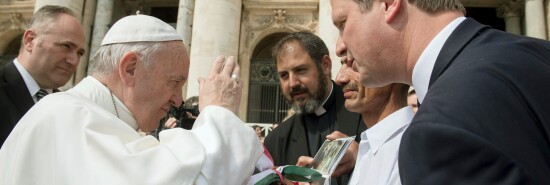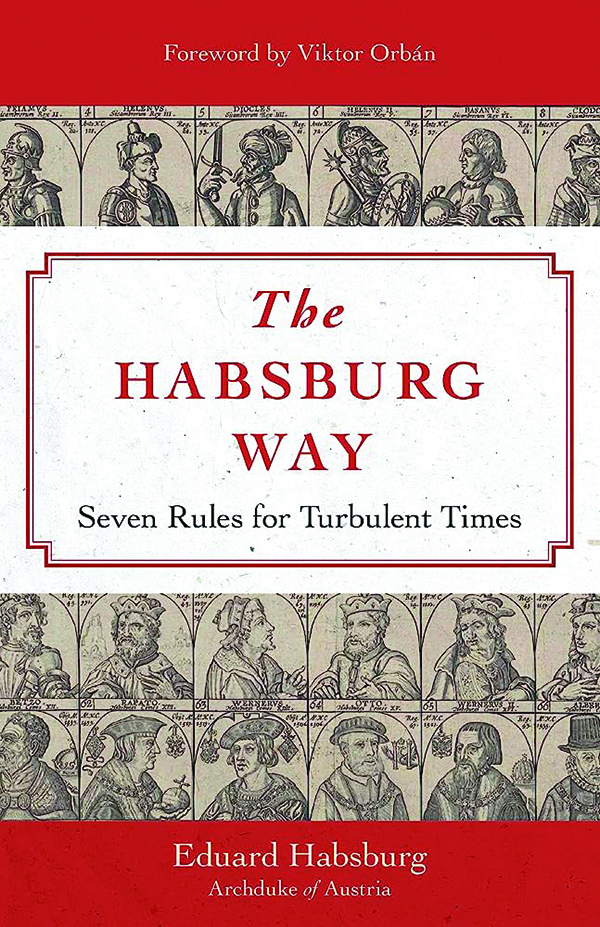
Archduke’s Eduard von Habsburg’s advice to modernity
Dominic Green
After World War I culled Europe’s old empires, President Woodrow Wilson insisted on exporting statehood as America’s gift to Europe’s smaller peoples. Today, Americans in search of their own fraying nationhood look to small states for models of survival and even move to them. In May, when the Conservative Political Action Conference returned for a second meeting in Budapest, Hungary, it was greeted by a recently planted American colony, led by Rod Dreher. America’s New Right is nostalgic for the Old World.

What does Viktor Orban’s small, illiberal, monolithically white, and mostly Catholic Hungary have to offer the gigantic, chaotically free, racially and religiously mixed United States? One answer would be Catholic social policy. Catholic intellectuals are to the New Right as Protestants were to the evangelicals and Jews to the neoconservatives. Another is trolling the liberals. Nothing makes them squeak “Fascism!” faster than classical nationalism. A third is Old Right racism, dressed up as cultural protectionism. The New Right needs no lessons from Europe on this: Its godfather is Pat Buchanan.
THINKING DOUBLY HARD ABOUT GEORGE ORWELL
There is, however, another Hungarian rhapsody in the air, one whose precedent might be more useful to the U.S. today. Nostalgia for the Austro-Hungarian Empire began within minutes of Karl I’s journey into exile in 1918. Its literary eulogists were top quality (Musil, Zweig, Roth). Its nationalist heirs were so appalling that the empire’s stuffy and autocratic rule soon seemed tolerable, the price of cosmopolitanism. Unlike its successors, the empire balanced German-speaking internationalism with the polyglot Ruritanian variety of central Europe.
The Habsburgs came unstuck through nationalism and democracy. These are sacred principles in the U.S. Until recently, the notion that Habsburg history might be a useful resource for modern Americans would have seemed ludicrous. Today, however, American society is, as the Habsburgs used to say, “Balkanized” along racial, regional, and linguistic lines. A crumbling federal bureaucracy responds as the Habsburgs did, by granting ever greater autonomy to its restive provinces. But this only encourages further separatist demands. All roads lead to Sarajevo.
If the Habsburg past is becoming the American future, it must be time for The Habsburg Way, a book from Eduard von Habsburg, a surprisingly online archduke of Austria who has written a guide to life and self-rule in the family way. He is the great-great-great-grandson of Franz Joseph I, the luxuriantly mustachioed emperor who ruled the Dual Monarchy for almost all of its existence, from 1848 to 1916. I am the seven-times-great-grandson of Pinchas Linzenberg, an innkeeper at Tarnow who, along with the rest of Galicia and its Jews, became part of the empire in 1792. Mr. Habsburg, nice to see you again.
Eduard, if I may, is the Hungarian ambassador to the Vatican. This sounds like something from a Dan Brown novel, but it is a real job. Hungary, along with Poland, is rebalancing the Franco-German fix that has long dominated the European Union. The Hungarians and Poles oppose EU orders from Brussels for the same reasons they used to oppose Habsburg rule from Vienna. They differ over Russia, of course.
This complex topicality explains The Habsburg Way’s odd mixture of endorsements. Newt Gingrich finds that the Habsburgs’ rules for ruling “are as applicable today as they have been for centuries.” The late and rather controversial Cardinal George Pell praises the Habsburgs as “serious Catholics” who believed in “justice and the rule of law, bravery, and service.” Orban says the Habsburgs and the Hungarians are now “on the same side,” “going into battle” to defend Christianity and the family and making central Europe “a strong independent player in world politics.” Michael Knowles of the Daily Wire, groveling like a periwigged flunky, reckons this is “the single most important history book to appear in our troubled times.”
The Habsburg Way is, like the Habsburg genealogy, a mixed bag. It is a spiritual how-to guide written by a deeply religious Catholic and paterfamilias. It is a political how-to guide, wincing with the wisdom of hindsight. It is a useful heroes-and-villains sketch of the family history, with the Habsburgs as the heroes and Protestant heretics, subversive Freemasons, and centralizing bureaucrats as the villains.
Eduard also makes two political arguments. Both are hard to disagree with on present evidence.
One is that as public life is demoralized, Christianity shunted out of the public square, and America turned into a society of warring tribes, the Habsburgs “stand for timeless things like family, faith, the peaceful cohabitation of nations and languages, and the peaceful coexistence of diverse races and cultures.” The other is that the Habsburgs are a case study in subsidiarity, “the principle that issues should be addressed by the lowest institutional level that is competent to resolve them.” This has been a “bedrock principle of Catholic social teaching for millennia.” It is a “key principle in the United States.” It “should also be a ruling principle for the EU,” but it isn’t.
Rule 1: Get married and have children. The Habsburgs have always gone at it like rabbits. The record-holder is Empress Maria Theresa (1767-1780), with 16 children. Eduard has a mere six. Once they’re grown, play the game of “marriage politics.” The Habsburgs started in 1247 as local princes, then parlayed themselves into the post of Holy Roman emperor — hence the joke that it wasn’t Roman, wasn’t an empire, and wasn’t very holy either. By the early 1500s, a Habsburg, Charles V, was king of Spain, and his brother Ferdinand was emperor of Austria. The interbreeding of the Spanish and Austrian lines was, Eduard allows, “bad for the health and genetics of the family,” but the famous “Habsburg jaw,” he insists, came from the Spanish in-laws.
Rule 2 (“Be Catholic”) and Rule 3 (“Believe in the Empire”) come to much the same thing. Charles had no choice but to condemn Martin Luther as a heretic. While Maria Theresa was pious, her husband, Francis of Lorraine, “was not only devoted to the Enlightenment but actually a Freemason.” Apart from complicating their practice of Rule 1, this caused their son Joseph II (1765-1790) to read Voltaire and visit prostitutes. In a further deviation from reason and morality, he sought to emulate the reforming Frederick II of Prussia and attacked the church. You have been warned.
Rule 4 (“Stand for Law and Justice”) is the topical-political part. Though the Habsburgs held power in various parts of Europe for centuries, the Dual Monarchy of Austro-Hungary was a modern invention. Created in 1867, it was a peer of Reconstruction-era America and constructed for similar reasons, the reconciliation of enemies under a federal system. The difference is democracy.
Eduard knows that arguing the merits of monarchy is an uphill battle with Americans, but Rule 6 is “Be Brave in Battle,” so off we go. Monarchs, he argues, are made as well as born. They are raised to serve their subjects. Compare this to “modern politicians” who, not having been “raised to responsibility,” fill their boots and pockets at the public’s expense. Even that habitual deviant Joseph freed the serfs and met millions of his subjects as he traveled around his realms.
Once, Joseph picked up a stranded traveler in his carriage. The traveler didn’t recognize him and “jokingly asked the emperor to guess what he had eaten for lunch.” The emperor failed. “I ate roast veal,” the traveler said and slapped him on the leg. Joseph countered, “Now it’s your turn: Who am I?” When the traveler realized that his host was the emperor, Joseph said, “You guessed it,” and slapped the traveler’s leg. Appalled, the man tried to get down from the carriage. “No, no, no,” the emperor said. “Nothing has changed. I knew who I was. You didn’t. Let’s roll on.”
Which brings us to Rule 5: “Know Who You Are.” As the Linzenbergs honor their heritage by forcing down gefilte fish, so Eduard’s lot join the Order of the Golden Fleece and do “Spanish” court ceremonial. Bear in mind that if you use the Sissi movies to remind yourself what that is, the “Spanish” protocol was “no longer fully observed in 1853.” Do it right, and you will fulfill Rule 7: Die Well. In 2004, Pope John Paul II beatified Eduard’s grandfather Karl, the last emperor. That’s halfway to sainthood and more than makes up for Joseph.
“Finally, what about you?” Eduard asks my inner innkeeper. “Do you know who you are?”
Yes, I believe I do. I, like Eduard von Habsburg, am a displaced subject of the Dual Monarchy.
CLICK HERE TO READ MORE FROM THE WASHINGTON EXAMINER
“Knowing who you are gives you sovereignty over yourself,” Eduard says sternly but not unkindly as he scrapes the Galician mud from his boot. “It will give you the confidence not to be swayed by fleeting fads but to follow the truth — about yourself and about God. The alternative is the empty aimlessness that torments so many and characterizes so much of modern life.”
He’s right. But there’s no room at the inn for the idea that a Habsburg restoration can save America.
Dominic Green is a columnist for the Washington Examiner and a fellow of the Royal Historical Society. Follow him on Twitter @drdominicgreen.
